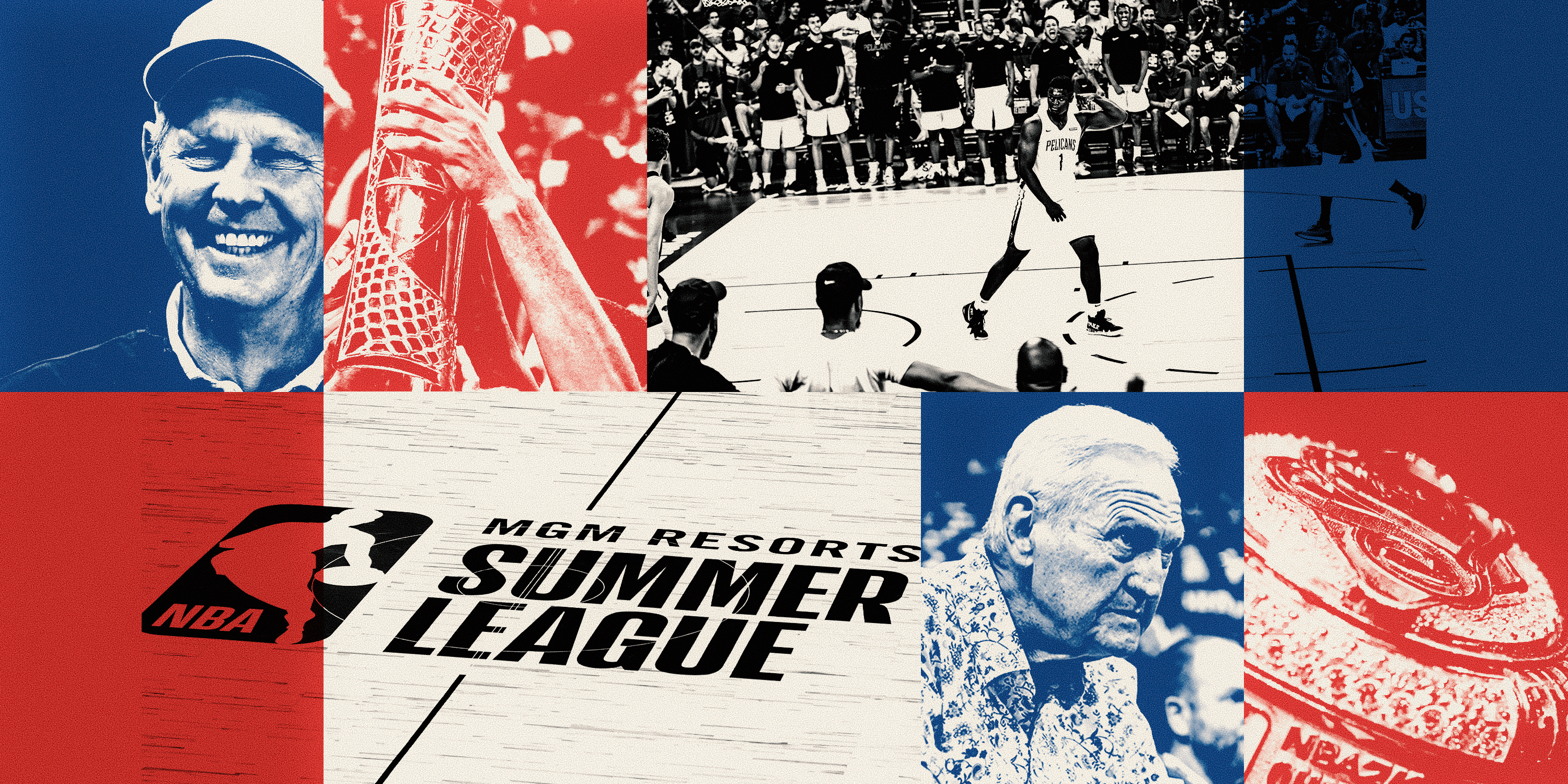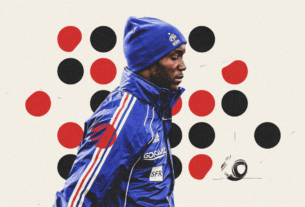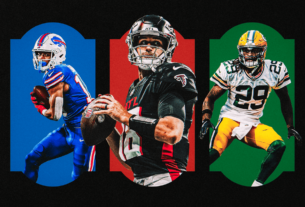LAS VEGAS — Twenty years ago, the shape of the NBA offseason changed forever.
Once players were drafted, teams would send their prospects to various small summer leagues scattered across the country. But in 2004, a new idea spawned in Las Vegas, seeking to bring the entire league together in one place.
Co-founded by player and coach agent Warren LeGarie alongside Albert Hall, they wanted everyone in the NBA universe traveling to Vegas each July. Now, the league is much more than just a scouting event for the next generation of NBA players. It has become the epicenter of the NBA offseason.
Jerry West, the late Hall of Fame player and executive: It first started when we did (a league) in LA. Teams wanted to showcase their players. Along the way, young kids like Kobe Bryant came in and with all the hype they had, the place would sell out every night. Teams started coming out there because they wanted to give their younger players a chance to play. When they moved to Long Beach, my gosh, it was really popping. But then they moved it back to LA and it sort of died out.
Warren LeGarie, Las Vegas Summer League co-founder: When I first started, I walked into a gym at Loyola Marymount (in Los Angeles), I didn’t know what to expect. I had a successful business selling fresh fruits and vegetables on the streets of LA from midnight until eight in the morning. All of the sudden, I walked into (the gym) and my life had meaning.
Monty McCutchen, NBA Senior Vice President of Development and Training for Referee Operations: After 30 years, I’ve seen a lot of iterations of summer league. I started as a young referee trying to get into the CBA when it was at Loyola Marymount. It was much more — I don’t use this term pejoratively — but lazy. It was this thing that was there and teams used it, but it didn’t have the energy to it the way this does now.
Rod Thorn, former NBA Executive Vice President of Basketball Operations: When Warren was pitching (over the years), he was like everybody wants to go to Vegas. I was like, “Wait a minute, are you serious?” But you had the Rocky Mountain League in Salt Lake City that didn’t have that many teams. Then you had the Orlando League with more teams, but no fans were there.
LeGarie: The hottest summer league going at the time, with 16 teams, there was Boston. You stayed in the hotels downtown, played at this small university where it was just one gym. They did it the old school way where guys are scrapping trying to find their calling in basketball. But then they had the Democratic National Convention and forgot to book hotel rooms and everything’s sold out.
Danny Ainge, former Boston Celtics GM and current Utah Jazz CEO: There was a national convention and we didn’t have a place (to play) and the city was packed. Once (the convention) went away, it was hard to restart again. So (Vegas) became the place.
By 2004, LeGarie was making progress with Thorn’s successor, Stu Jackson, to get a league together in Las Vegas. Once the Boston league shut down, the opportunity finally arrived.
LeGarie: After having met with (then-NBA Commissioner) David Stern at the (2004) All-Star game in LA, Stu calls me and goes, “You want to do a summer league? We’ll give you the authority to do it.”
Thorn: The commissioner talked about it with (former deputy commissioner) Russ Granik and myself and some of the marketing people about what they thought about it. It got a favorable response from that crew and he just decided to do it. Let’s take a whack at it and see if it works.
LeGarie: The good news was I got it. The bad news was, what the f— do I do now? The first call I made was to Albert (Hall), who I had connected with many years earlier in Seattle when I brought George Karl in from Europe to take over for KC Jones coaching the Seattle SuperSonics. I called Albert and said, “Summer league, what do you think?”
Albert Hall, Las Vegas Summer League co-founder: Warren got six teams, I went to work on the marketing, (then-agent and future Warriors GM) Bob (Myers) went to work on sponsorship and team stuff, and we just went for it.
West: Warren, who had been involved (with the Long Beach league), saw the potential to move it up to Vegas.
Hall: The first year was just like who f—ing knows? We got a credit card, let’s see if we can do this.
The first thing they needed to secure couldn’t be paid for with a credit card. They needed a venue to host the tournament. To book the Thomas and Mack Center at UNLV, LeGarie reached out to the late Chip Hooper, an event booker for major musical acts at the time, such as Dave Matthews Band, Black Eyed Peas and Phish.
LeGarie: Chip goes to the guy who runs Thomas and Mack arena and we didn’t pay rent our first year because (Hooper) promised he would get Phish, who was going to play there for New Years anyway. So that saved us right there.
Hall: Then we were 45 days out and we didn’t even have a hotel. So I send a size 20 shoe to the guy at the New York-New York (hotel and casino) with a proposal (written on it) that says, “Hey, we’re just trying to get our foot in the door.” He’s like, “What the f— is this?” We ended up getting a hotel for the teams at New York-New York.
I found a timeshare place at the Fairfield Inn and we put our staff up there. The key though is we had to sit in on all the timeshare meetings. After we sat in on the first one, we were trying to hide from the management at the hotel because they wanted us to go every day.
Dennis Rodgers, initial summer league intern and current Los Angeles Clippers Director of Basketball Communications: It was right on the corner where Tupac got shot, but we had a washer and dryer and everyone was in an adjoining room together. When we’d get back after working a 15-hour day, we’d quickly pass the front desk so we didn’t get roped into a timeshare presentation. I was very young, so they probably thought I was someone’s kid or something.

Becky Hammon coached the San Antonio Spurs to the Vegas League title in 2015. (Garrett Ellwood / NBAE via Getty Images)
Hall: Warren and Danny (Ainge) had known each other forever, so Danny built his first summer league teams with Rajon Rondo, Al Jefferson, Kendrick Perkins, Tony Allen and Gerald Green.
Ainge: Every team brings multiple people from scouting and coaching staffs here and they’re assigned to every game at the summer league. I used to always joke with Kendrick Perkins when he’d say, “Where have you been for the last couple weeks?” I’d say, “I’m out looking for players better than you.”
Hall: Boston was loaded and then we needed a sixth team, so Orlando came on late with Dwight Howard as the No. 1 pick. So we had this gym with big-time guys and nobody knew they were playing there. They thought it was some circus act cruising through Vegas, but this was real NBA players.
Rodgers: On the strip, you see people passing out flyers with girls on it. Well, that was us passing out game schedules and ticket info for summer league.
Hall: That first year, it was like we had no one there. I always joke that we had inflatable people in the stands.
Rodgers: We had this blow-up NBA logo that we put on the street corner outside UNLV. But Vegas in July is monsoon season, so a lot of times the logo would go down and I’d sprint outside to hold this gigantic NBA logo up. It was anything to help grow the league because nobody knew that first year. We didn’t have social media, so you had to hit the ground running.
Those first two years, we really struggled for attendance. But then in our third or fourth year, we went from six to 10 teams and the word was getting out that it was a great opportunity to not only come to a fun city, but the people in charge knew what they were doing and your young guys would get to play on a national stage.
Ainge: Everybody was going to be there. It was going to be an opportunity not to just play, but see every team in the NBA, so you get a chance to scout. It was a simplification of everybody’s job in the summertime.
Keith Grant, former Dallas Mavericks Assistant GM: (LeGarie) picked my brain on a lot of things. I had been the Mavericks’ guy for summer leagues and we just talked about having practice facilities and things to make it one-stop shopping.
As the summer league became the focal point for offseason scouting as teams sought to find training camp invites, eventually all 30 franchises joined in. That eventually led to the NBA revising its annual calendar to conduct all sorts of business during the summer league. The league shifted its officiating training program and tech expo to Vegas. The summer league began hosting the Sports Business Classroom to provide training programs for people looking to break into the NBA business. Just about every facet of the league’s growth and innovation made July in Vegas a key date.
Grant: In the old days, the NBA had league meetings in the fall at Palm Springs or Boca Raton, but there was no basketball involved. When you add the basketball to it, it’s a win-win.
Thorn: League meetings were (now) being held in Las Vegas concurrent with the (summer) league. It made sense. I think it goes back to most people enjoying going to Vegas because there’s a lot to do there.
LeGarie: Our idea was to make it so that people not only want to be here, but they feel it’s necessary to be here because if you’re not in Vegas, you’re missing out.
Ainge: It’s a place where we have conventions of all sorts, from general manager conventions to ownership board meetings to personal assistant meetings and players union meetings. Every imaginable role that you can play in the NBA, you’re gonna have a meeting here in Vegas. Those conventions were in different places, different times of the year. Now it’s all one-stop shopping.
LeGarie: We always believed this would become like South by Southwest. In addition to basketball, we’d bring in music, people doing documentaries about athletes, a cross-section of everything else.
Thorn: There’s always speculation that if and when the NBA does expand, Las Vegas probably will be one of the cities. It’s a place that does a good job of promoting itself and people like to go there.
Hall: With Sports Business Classroom, we have a place where these kids can learn from the best and brightest. Teams are now recruiting out of our SBC program.
LeGarie: We had the winners of the research paper (competition) from the MIT Sloan Sports Analytics Conference to present here. Every year, we’d hear analytics is important. So we brought in analytics speakers. The cap became a big issue because very few people understood it, so it became a weapon and you could cripple another team if you knew that cap.
The underlying Machiavellian reasoning behind these programs was the guys who grew from them into positions of power would say, “We’re going to Vegas, those f—ing guys were there for me when nobody else really was.” So it was a little bit selfish from that standpoint.
West: Warren’s a character and we’re losing characters. I’ve always been attracted to people like that. They do things differently, but at the end of the day, they’re great guys and get it accomplished. The league has supported him and given him a boost in a sense. It’s his vision and they wanted to be a part of it. They’re smart enough to know how important this is.
It provides an unbelievable opportunity for young people who love the game and have something they want to become in their lives. You see all these young people trying to get experience and there are going to be head coaches that come from this experience in the summer league. It encompasses almost everything an organization does.
McCutchen: When I was younger, (referee training) morning sessions were 15 or 20 minutes and we met in a room the size of a bedroom. (Now) we meet in a conference room that has 100 people in the room and two gigantic screens. We train every morning in a classroom and then we’re in the gym all day to evaluate and educate the next generation of referees. The neat thing about that is that you start building relationships now. Referees are going to be able to build relationships with young assistant coaches who aspire to be head coaches and young draft picks. I always remembered the people I came in with, so those things are invaluable.
Rodgers: It’s an incredible opportunity for young people to break into the industry. I mean, at the Clippers, we have five people who started NBA summer league employed. You have 100-to-130 interns every year now. When I started, it was just me.
Hall: We didn’t want it to become this corporate-type thing. We were like this has to keep its street cred and grittiness to it because that’s what it’s all about. You get to see eight games a day and you’re rubbing elbows with everybody.
West: One of the things that’s really interesting is you see all the men who have watched the teams and players they love and they bring their sons. It’s almost a legacy bringing these people back.
McCutchen: Families can come here at less cost than going to a playoff game, for example. And so there’s a whole new way in which we’re generating new generations of fan bases through this sense of the electric meeting place that the summer league has become.
Ainge: Every summer league is a fun time. There’s something new and fresh. Whether you just have one second-round pick or you have a couple young free agents you want to take a look at, there’s always something new and I love that part of it.
(Photo illustration: Sean Reilly / The Athletic. Photos: Chris Gardner, Ethan Miller, Cassy Athena, Allen Berezovsky, Bart Young / Getty Images.)





